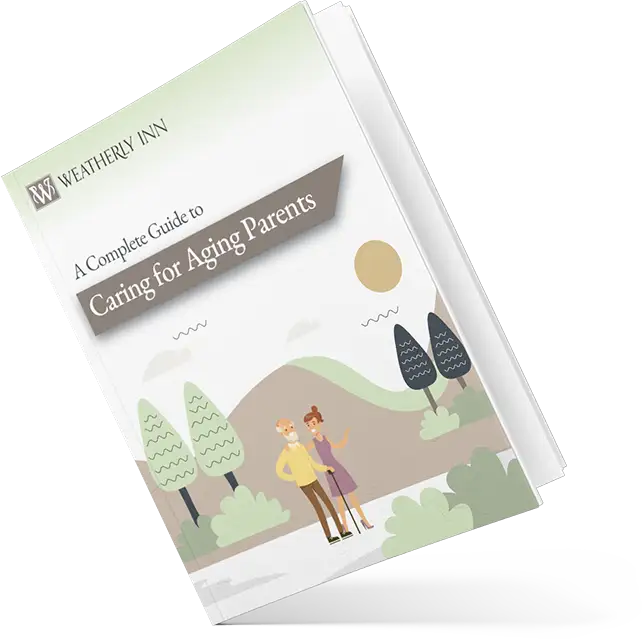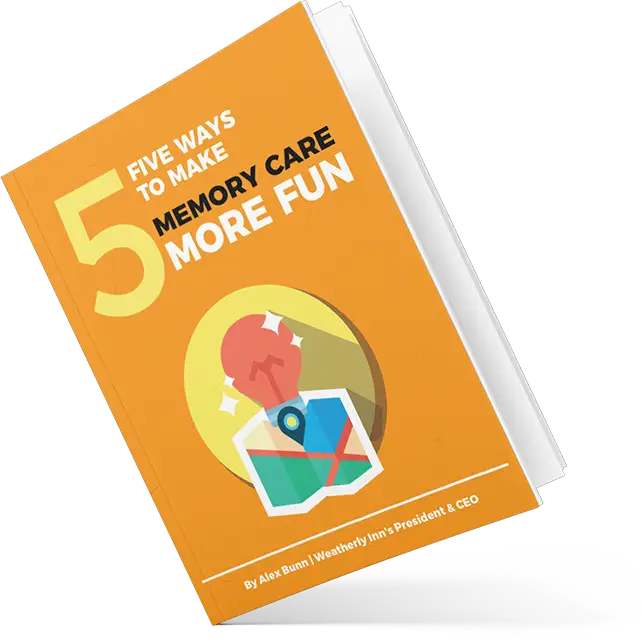February 4, 2019
For Julie, the idea of moving her husband into a memory care community wasn’t an easy decision. While she dedicated significant time serving as his caregiver, John was highly functional, and they weren’t sure that memory care would benefit him. But Julie wanted to be a wife to her husband, not a caregiver, so they decided to explore what memory care could offer.
John has been living at Weatherly Inn for five months now and is thriving. Staff members have noticed him making new friends at every turn, and he’s become famous for his dance battles with other residents. Julie now feels free to return to her identity as a wife, and she enjoys spending time with her husband at Weatherly Inn. She is confident that John is loving his new community. When people visit, he shows off the community as if he is touring guests around his home (which he is!).
John’s story is not uncommon. Families often keep their loved one living with dementia at home until the care becomes overwhelming or the caregiver (often a spouse) has a medical event of their own. The most helpful thing family can do to prepare for their loved one’s current and anticipated needs is to learn about the different types of resources available and how they might be beneficial when the time is right.
Memory Care vs. Assisted Living: What’s the Difference?
Assisted living communities are designed for seniors who may need a little help with daily activities or who may just be ready to leave behind preparing meals and/or maintaining a house. This long-term living option provides residents with freedom and flexibility while offering reassurance that help is readily available. Apartments give residents a home atmosphere, simultaneously making it easy for care providers to access them. Many assisted living communities plan activities, offer transportation, host classes, and encourage seniors to stay engaged in life.
Memory care communities are specially equipped to serve people with memory issues that come with Alzheimer’s disease and other types of dementia. Memory care communities provide care supervised by nurses who are trained to work with those who have memory loss. Memory care staff understand that residents need regular routine and help with everyday activities. In addition, memory care communities are also specifically designed for people with memory issues. Buildings are highly secure to ensure that residents don’t accidentally wander away. Special room layouts make it easy for staff to keep track of residents who are unsure where they’re going. The goal of memory care is to help residents enjoy the best possible quality of life, so a variety of appropriate activities are also offered.
Why Memory Care?
Why is it important for those living with memory loss to be in a community that’s designed especially for them? Memory care has several unique purposes. Let’s explore them.
1. Care is Tailored to Residents Living with Memory Loss Across the Spectrum
No matter how early in development or how advanced a person’s memory loss may become, a memory care community can help. These communities offer flexible care so residents can receive precisely the kind of care they need at every stage, while being free to explore their world and enjoy life. They have a high staff-to-resident ratio so careful attention can be given to keep resident actively engaged throughout the day.
2. Buildings are Specially Designed
Those with memory loss face unique challenges that can cause anxiety and safety concerns. Memory care communities are designed especially to address these challenges. They provide residents with a safe place to wander freely indoors and outdoors while maintaining security to prevent accidental wandering away. Hallways are designed to be easy to navigate without “dead ends” and limited corners so residents who enjoy walking can avoid discouraging moments of confusion.
3. Specially-Trained Staff
Staff are specially trained and qualified to provide care for those with memory loss. They are equipped with communication techniques that allow them to calmly and confidently redirect residents in order to help avoid confusion or frustration and to maintain safety.
4. Thoughtful Activity Programs
Activities are planned around the senses, keeping the latest medical knowledge in mind. This is called “sensory-based programming” and may include things like hand massages, spending time in a garden, and interacting with items that have interesting textures and colors. The results boost mood, increase positive social interaction, and reduce anxiety.
The Benefits of Memory Care
People who live in memory care communities enjoy a myriad benefits. Here are the top five that family members appreciate about memory care.
1. Social Support
One of the biggest benefits that memory care offers is social support — for both the resident and the family. In the wider world, memory illness is often misunderstood, so being in a place where people understand and encourage is refreshing. Some communities even offer support group meetings; check with your community of choice. Residents are surrounded with caring staff and other community members who are going through the same struggles that they are. They feel at home and supported. Family members can relax and resume their family roles, leaving the majority of caregiving to the staff.
2. Security
One of the main reasons people choose a memory care environment for their loved one is security. At home, it can be difficult to provide and environment that protects against the dangers of wandering. Family caregivers become unable to leave the home or even take eyes off their loved one for fear that they will exit or find themselves in a dangerous situation. In a memory care setting, these risks are significantly reduced by safely coded doors and high staff to resident ratios, providing peace of mind for the family and as much independence as possible for the resident.
3. Cognitive Care
Research shows there are many things that can be done to slow the development of memory disease, from playing musical instruments to exercising. Memory care communities are knowledgeable about these tactics and add them into daily life for the residents to strengthen cognitive health. These activities also serve to keep the residents engaged and reduce stress and lead to happier interactions with family.
4. Personal Care
Many residents need help with everyday activities, like getting dressed and taking care of personal hygiene. This care can be very difficult to provide for someone with memory loss. As a result, family members often report that this element of care is one that they are relieved to hand off to trained staff members. Additionally, home caregivers often suffer as the result of providing physically challenging personal care for their loved one. Family members can rest assured knowing that their loved one is receiving good care and is being well taken care of while saving themselves the stress of providing this care themselves
5. Transportation Services
Everyone wants to get out of the house on a regular basis, including those living with memory loss. Getting out of the house can be increasingly difficult as the care needs become more constant and the family caregiver becomes less able to manage this care on their own. Supervised trips provided by a memory care community allow residents to enjoy a variety of excursions without fear of getting lost or encountering a personal care need while out. Additionally, memory care communities may provide safe transportation to doctors’ appointments. The transportation services provided in a community setting allow residents to enjoy a level of freedom they have often lost living at home.
Today, Julie and John are happy with their decision to come to Weatherly Inn. John is thriving, and Julie has peace of mind knowing that he’s enjoying life and is receiving the best care. Julie looks forward to her visits with John and experiences less stress now that she has a support team helping her with John’s care.



